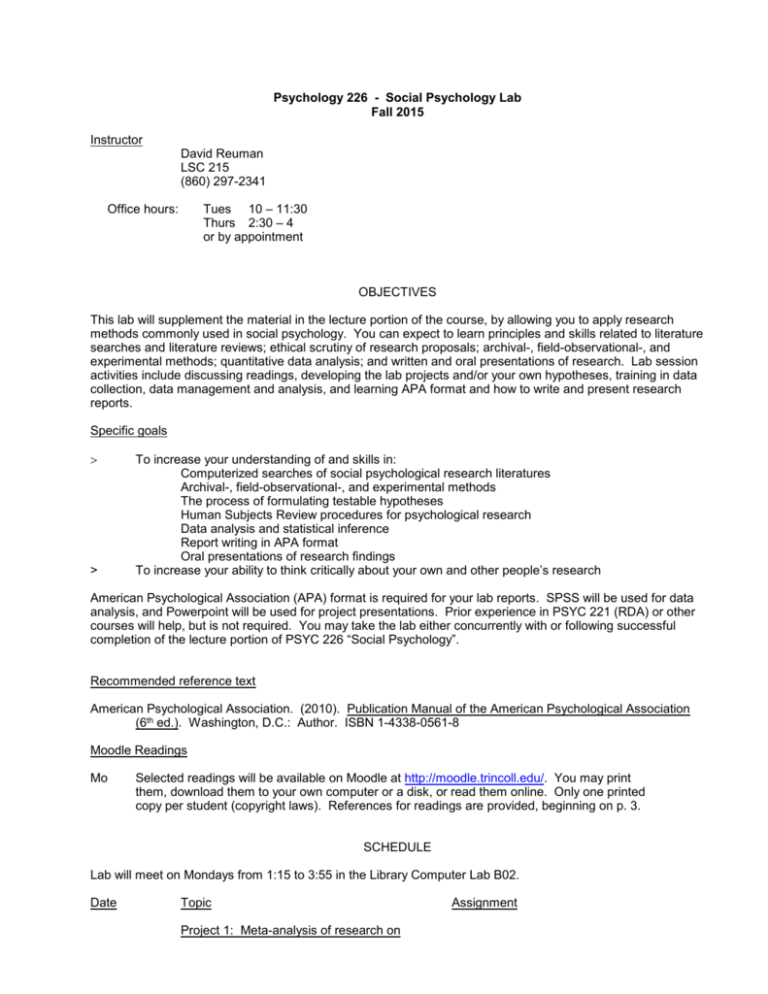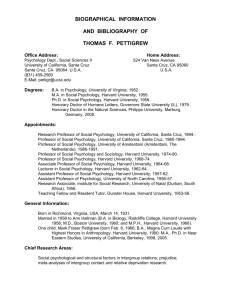Psychology 226 -- Social Psychology
advertisement

Psychology 226 - Social Psychology Lab Fall 2015 Instructor David Reuman LSC 215 (860) 297-2341 Tues 10 – 11:30 Thurs 2:30 – 4 or by appointment Office hours: OBJECTIVES This lab will supplement the material in the lecture portion of the course, by allowing you to apply research methods commonly used in social psychology. You can expect to learn principles and skills related to literature searches and literature reviews; ethical scrutiny of research proposals; archival-, field-observational-, and experimental methods; quantitative data analysis; and written and oral presentations of research. Lab session activities include discussing readings, developing the lab projects and/or your own hypotheses, training in data collection, data management and analysis, and learning APA format and how to write and present research reports. Specific goals > To increase your understanding of and skills in: Computerized searches of social psychological research literatures Archival-, field-observational-, and experimental methods The process of formulating testable hypotheses Human Subjects Review procedures for psychological research Data analysis and statistical inference Report writing in APA format Oral presentations of research findings To increase your ability to think critically about your own and other people’s research American Psychological Association (APA) format is required for your lab reports. SPSS will be used for data analysis, and Powerpoint will be used for project presentations. Prior experience in PSYC 221 (RDA) or other courses will help, but is not required. You may take the lab either concurrently with or following successful completion of the lecture portion of PSYC 226 “Social Psychology”. Recommended reference text American Psychological Association. (2010). Publication Manual of the American Psychological Association (6th ed.). Washington, D.C.: Author. ISBN 1-4338-0561-8 Moodle Readings Mo Selected readings will be available on Moodle at http://moodle.trincoll.edu/. You may print them, download them to your own computer or a disk, or read them online. Only one printed copy per student (copyright laws). References for readings are provided, beginning on p. 3. SCHEDULE Lab will meet on Mondays from 1:15 to 3:55 in the Library Computer Lab B02. Date Topic Project 1: Meta-analysis of research on Assignment Psychology 226 Lab/ Fall 2015 2 Intergroup Contact and Prejudice M 9/14 Lab overview. Introduction to Project 1. M 9/21 Discussion of overview readings; effect size coding Mo 1 – Mo 6 M 9/28 Discussion of coded studies; literature search methods Mo 7 – Mo 16; Code 2 studies M 10/5 Discussion of literature search results; evaluation of meta-analysis. Literature search; Code 2 studies M 10/12 Trinity Day – No lab Project 2: Non-reactive campus research: Personal Space Invasions M 10/19 Introduction to Project 2. Discuss overview reading. Hypothesis formulation, team formation, and protocol and IRB proposal development. M 10/26 Data collection. M 11/2 Data management and analysis; develop Powerpoint presentations. M 11/9 Powerpoint presentations / critiques. Project 1 Report; Mo 18; Ethics certification Project 3: Experimental research in the lab: Intergroup Dynamics and In-group Bias Introduction to Project 3. M 11/16 Discussion of overview reading; Project 2 Report; hypothesis formulation; Mo 19 protocol and IRB proposal development. M 11/23 Data collection. M 11/30 Data collection (continued). M 12/7 Data management, entry, and analysis; develop Powerpoint presentations. M 12/14 Powerpoint presentations / critiques. Moodle Readings Project 3 Report 1. Pettigrew, T. F., & Tropp, L. R. (2011). Does intergroup contact typically reduce intergroup prejudice? In T. F. Pettigrew and L. R. Tropp, When Groups Meet: The Dynamics of Intergroup Contact (pp. 13-27). New York: Psychology Press. 2. Pettigrew, T. F., & Tropp, L. R. (2011). Are the effects of intergroup contact universal? In T. F. Pettigrew and L. R. Tropp, When Groups Meet: The Dynamics of Intergroup Contact (pp. 4960). New York: Psychology Press. 3. Pettigrew, T. F., & Tropp, L. R. (2011). How does intergroup contact reduce prejudice? In T. F. Pettigrew and L. R. Tropp, When Groups Meet: The Dynamics of Intergroup Contact (pp. 7795). New York: Psychology Press. Psychology 226 Lab/ Fall 2015 3 4. Pettigrew, T. F., & Tropp, L. R. (2006). A meta-analytic test of intergroup contact theory. Journal of Personality and Social Psychology, 90 (5), 751-783. 5. Johnson, B. T., & Eagly, A. H. (2000). Quantitative synthesis of social psychological research. In H. T. Reis and C. M. Judd (Eds.), Handbook of Research Methods in Personality and Social Psychology (pp. 496-528). Cambridge, MA: Cambridge University Press. 6. Eaton, W. O., & Clore, G. L. (1975). Interracial imitation at a summer camp. Journal of Personality and Social Psychology, 32(6), 1099-1105. doi:10.1037/0022-3514.32.6.1099 7. Antonak, R. F. (1981). Prediction of attitudes toward disabled persons: A multivariate analysis. Journal of General Psychology, 104(1), 119-123. doi:10.1080/00221309.1981.9921026 8. Bowman, R. (1979). Public attitudes toward homosexuality in New Zealand. International Review of Modern Sociology, 9(2), 229-238. 9. Britt, T. W., Bonieci, K. A., Vescio, T. K., Biernat, M., & Brown, L. M. (1996). Intergroup anxiety: A person × situation approach. Personality and Social Psychology Bulletin, 22(11), 11771188. doi:10.1177/01461672962211008 10. Fichten, C. S., & Amsel, R. (1986). Trait attributions about college students with a physical disability: Circumplex analyses and methodological issues. Journal of Applied Social Psychology, 16(5), 410-427. doi:10.1111/j.1559-1816.1986.tb01149.x 11. Hale, N. M. (1998). Effects of age and interpersonal contact on stereotyping of the elderly. Current Psychology: A Journal for Diverse Perspectives on Diverse Psychological Issues, 17(1), 28-47. doi:10.1007/s12144-998-1019-2 12. Hansen, G. L. (1982). Measuring prejudice against homosexuality (homosexism) among college students: A new scale. Journal of Social Psychology, 117, 233-236. doi:10.1080/00224545.1982.9713432 13. Herek, G. M., & Glunt, E. K. (1993). Interpersonal contact and heterosexuals' attitudes toward gay men: Results from a national survey. Journal of Sex Research, 30(3), 239-244. doi:10.1080/00224499309551707 14. Hillman, J. L., & Stricker, G. (1996). Predictor's of college students' knowledge of and attitudes toward elderly sexuality: The relevance of grandparental contact. Educational Gerontology, 22(6), 539-555. doi:10.1080/0360127960220603 15. Knox, V. J., Gekoski, W. L., & Johnson, E. A. (1986). Contact with and perceptions of the elderly. The Gerontologist, 26(3), 309-313. 16. Slavin, R. E. (1979). Effects of biracial learning teams on cross-racial friendships. Journal of Educational Psychology, 71(3), 381-387. doi:10.1037/0022-0663.71.3.381 17. Wolf, F. M. (1986). Meta-analysis: Quantitative Methods for Research Synthesis. Beverly Hills, CA: Sage Publications. (optional) 18. McKenna, R. J. (1995). Nonreactive campus research: Human interventions. In The Undergraduate Researcher’s Handbook: Creative Experimentation in Social Psychology (pp. 163-183). Boston, MA: Allyn & Bacon. 19. Breakwell, G. M. (1988). An aspect of prejudice. In G. M. Breakwell, H. Foot, and R. Gilmour (Eds.), Doing Social Psychology: Laboratory and Field Exercises (pp. 263-278). Cambridge: Cambridge University Press. Psychology 226 Lab/ Fall 2015 4 LAB REQUIREMENTS 1) Reports. There will be three written reports, one for each lab project. An APA-format report contains the following components: title page, abstract, introduction section, method section, results section, discussion section, reference list, and tables/figures. You will write some components for each project (e.g., for one project you may not have to write the method section, for another you may write shortened introduction and discussion sections). Each of the reports will count for 25 percent of your total lab grade. 2) Assignments. These include both out-of-lab assignments (such as coding effect size estimates from primary research reports) and in-lab assignments (such as developing project protocols and IRB proposals). Assignments completed outside of lab must be handed in on time. You must complete online training for conducting research with human participants by Monday, October 19. Trinity now requires the Collaborative Institutional Training Initiative (CITI) training. You will need to provide a copy of your certificate. The information and quizzes for the CITI training are online; the process takes between 4 and 6 hours in total and does not need to be done in one session. There are more details about this on the Moodle site for the lab. 3) Data Collection, Management, and Analysis. Data collection is an integral part of the research process. Your data must be handed in on time, in the proper format, and must be accurate, legible, and complete. This is important because the entire group depends on the quality of each individual’s data collection. You will also be required to enter data (into an SPSS file) for at least one project. This will be graded and will count toward your overall grade, as part of the data collection component. Again, accuracy is very important. Finally, each of the three projects will involve use of descriptive and inferential statistics. Prior knowledge of statistics and skills with SPSS are useful but not required. 4) Participation. Applying your knowledge interactively is a main goal of this lab. Lab discussions will frame the research questions that we pursue and will ultimately influence your lab reports. Learning to work with others in a research setting is also very useful, whether you intend to pursue research as a career or not. Lab participation includes attending all lab sessions, as well as offering meaningful comments (e.g., about readings, project designs, reports) during lab, and contributing to Powerpoint presentations for Projects 2 and 3. Overall Grade: Each lab component will be worth the following percent of your final lab grade: Reports: 75% Assignments: 10% Data Collection: 10% Participation: 5% * Important notices will be sent via e-mail. Check your e-mail regularly! ** This syllabus is subject to change.




